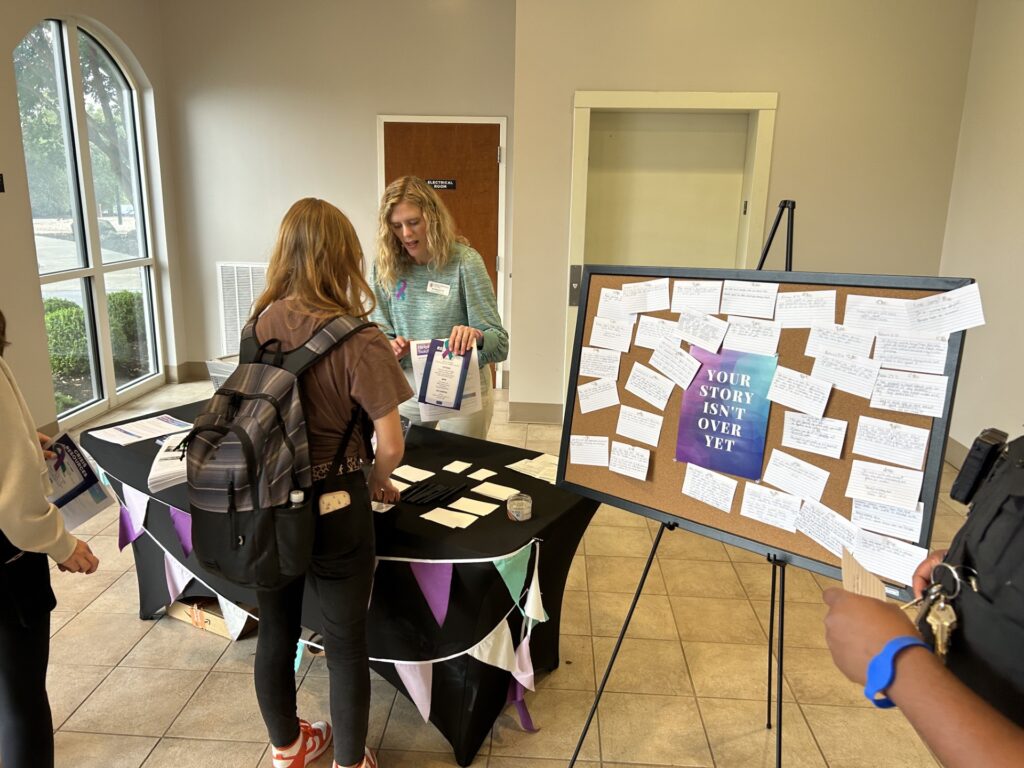
“Your story’s not over yet”: Campus security and counselors unite for suicide prevention
Photo by Carolyn Christopher
Carolyn Christopher, Staff Writer
The trials of life are all around us, whether as apparent as a flat tire or as invisible as a heartbreak. Campus security and counselors know that suicide prevention is important to be educated on no matter your state in life.
On September 25, 2024, North Greenville University campus security collaborated with campus counselors to host a suicide prevention booth outside of the cafeteria. The event lasted an hour and drew in several students asking questions about suicide prevention. They were given pamphlets, stickers and bracelets to spread awareness.
Sarah Black, counselor and coordinator of education and outreach, said, “We wanted to focus on caring for one another, making it known to other people that we’re here for one another.”
A bulletin board was set up at the booth with a graphic reading, “Your story’s not over yet.” Over 60 students filled out note cards with encouraging statements, scripture verses and prayers to be placed on the board. The board and its uplifting notes can be seen over the next few weeks in the prayer chapel on campus.
Black stressed the importance of having a good support system of people you can talk to. For many, that is a close friend, family member or even pastor.
The most common stressors Black has noticed in college students are anxiety, depression and relationships. NGU counselors focus largely on teaching students how to cope with their stress, anxiety and depression. If left unacknowledged, those worries can become self-deprecating.
There are two most common scenarios when suicidal tendencies emerge in someone around you. Those are when someone says directly that they’re suicidal or when they say nothing but there are signs.
Black said it is important not to assume someone is lying about suicide. If someone tells you they are suicidal, always assume they are telling the truth.
Many people are worried to ask if someone is suicidal or considering harming themselves. This is because they worry it will plant the idea in the person’s head if they were not already thinking about it.
“Tons of research has been done on that exact concern and all the research is showing that, actually, asking the question helps to start diffusing the situation,” Black said. “There have been no cases reported in which asking somebody if they were suicidal actually made them more suicidal.”
Asking the question can expose the idea and allow someone the opportunity and desire to talk about the situation. In response, offer empathic statements and encouragement and direct them to helpful resources.
Campus security hopes to become more approachable by letting students know they are there to help, whether for parking or mental health. They hope to spread awareness that it is important to get the help one needs.
DK Bruce, campus security sergeant, recognizes social and academic stress among college students that builds up over time. He said that talking about a difficult situation can release the tension of it, but it does not solve the problem.
“What most people don’t realize is that the more you speak about it with the person that is having suicidal thoughts, the easier it is for them to express themselves,” Bruce said.
On top of campus security’s ministry training, security officers have been trained by Black to respond to crises after counseling hours. The Columbia Protocol is an app-based assessment used by NGU officers to provide a simple way to evaluate people for suicide.
If a student is facing a crisis after counseling hours, they can contact campus security. An officer will respond and ask them a series of questions to determine the severity of their suicidal thoughts. They can then decide the next necessary steps for the student.
NGU security and counselors want to help people know they are not alone, even when they feel in the dark.
The booth’s purpose was to bring attention to the very real presence of suicidal thoughts.
“The thoughts come to any and everybody no matter how strong you think they are,” Bruce said. “The purpose for spreading the word is so that people feel more encouraged to help a friend in need, whether they can physically do it themselves or point them to resources.”
Students can fill out an online form for no cost, short-term counseling sessions on campus. That form can be found on NGU’s website and through the link on the counseling Instagram page.
A student can have approximately six sessions with university counselors. The student will then be connected with an off-campus, private practice or church setting counselors for long-term counseling if desired.
Crisis Resources:
Text Lines
- Lifeline: Text 988
- Crisis Text Line: Text “HOME” to 741-741
Hotlines
- Greenville: 864-271-8888
- National Lifeline: 988
- Christian – Hope for the Heart: 1-800-488-HOPE (4673)
Apps
- The Hope Line
- Better Stop Suicide
- Calm Harm
- Suicide Safety Plan
On Campus
- 911 or click “Mental Health” in LiveSafe App
